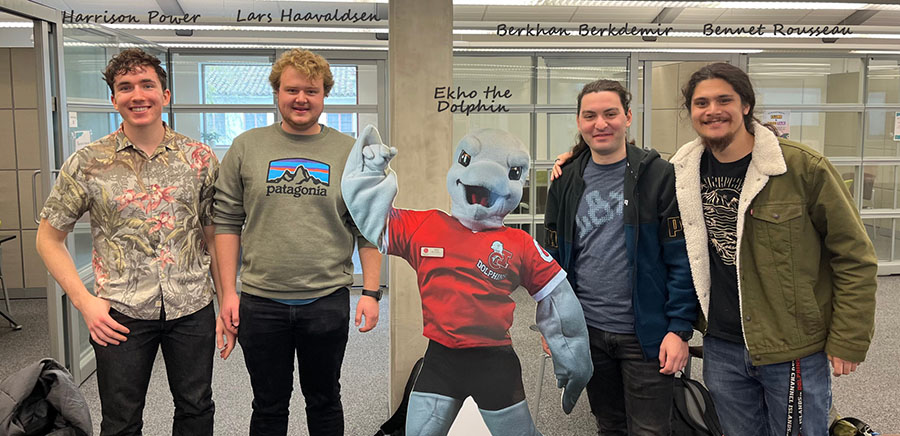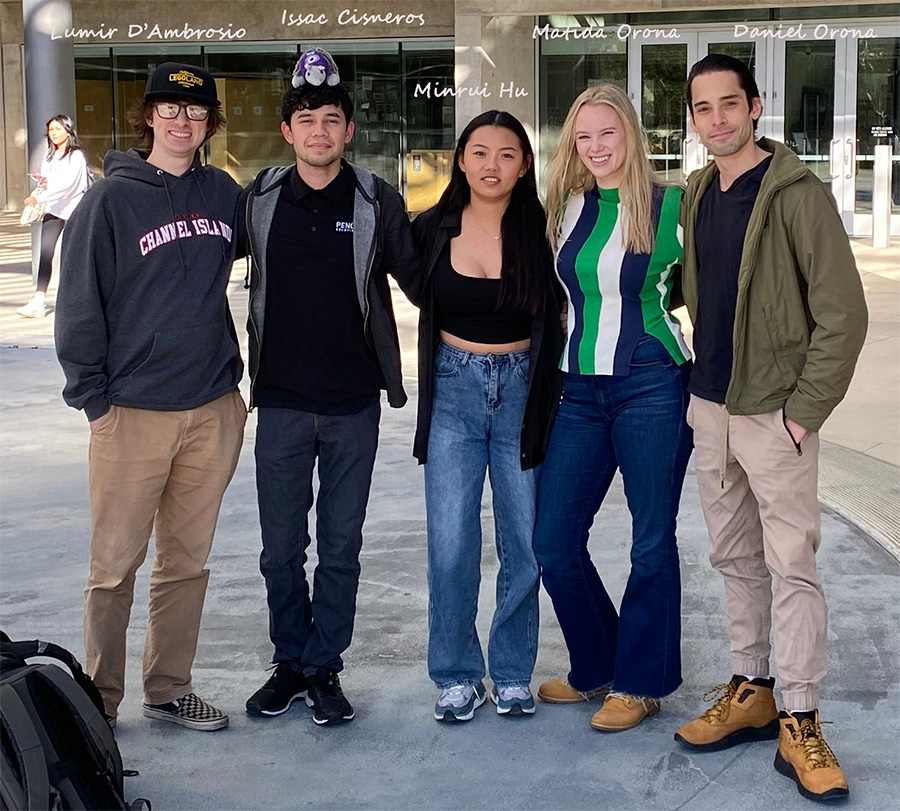by Kim Lamb Gregory
A national supercomputer competition is giving CSU Channel Islands (CSUCI) Computer Science students a rare opportunity to learn how to work with High Performance Computers (HPC)s in national laboratories and other large-scale computing centers around the U.S.
 Called the “2023 Winter Classic Invitational Student Cluster Competition”, the online contest began in February and will wrap up in mid-April. Every two weeks, all 12 of the competing universities and colleges spend a week with a mentor from a different national lab and their supercomputers. The supercomputer labs participating in the competition are: NASA, Amazon Web Services (AWS), Oak Ridge National Laboratory, Hewlett Packard and BioTeam.
Called the “2023 Winter Classic Invitational Student Cluster Competition”, the online contest began in February and will wrap up in mid-April. Every two weeks, all 12 of the competing universities and colleges spend a week with a mentor from a different national lab and their supercomputers. The supercomputer labs participating in the competition are: NASA, Amazon Web Services (AWS), Oak Ridge National Laboratory, Hewlett Packard and BioTeam.
The competition was organized in 2021 by Dan Olds, chief research officer for an HPC/AI industry analyst firm called Intersect360 Research.
“HPC is where the action is,” Olds said. “Every major scientific and industrial innovation in the last 50 years can be traced back to high performance computing. Artificial Intelligence, particularly machine learning and deep learning, begins with HPC. Understanding HPC and being able to work with HPC systems, is your ticket into virtually any industry that matters.”
Assistant Professor of Computer Science Scott Feister, who is coordinating the competition for CSUCI, agrees that the competition is a solid highlight on a resume.
“What really matters is career development,” Feister said. “They get to learn about careers in HPC, build technical skills and learn how to work on a team under pressure. And they meet people they can reach out to for internships. It’s like speed dating with national computing facilities.”
Each of these five cooperating supercomputer centers choose an application for the 12 student teams to run. Mentors from each center teach the students about the application and assist them as they get it up and running. After some practice, the students perform a final scored run of the application and turn in the results to their mentors.
At the end of the competition, each team is scored based on how well they have optimized the performance of the computer application and how well they present results to judges. All of the scores are added up to declare a winner.
CSUCI has two student teams in the 2023 competition: High Performance Dolphins Deluxe and Results Not Guaranteed. Computer Science major Harrison Power—a member of the High Performance Dolphins—said the experience so far has been fun, challenging and rewarding. Especially the week they spent with Hewlett Packard in which the High Performance Dolphins came in first place.
“They let us know the results about two or three weeks after each competition,” Power said. “So after the Hewlett Packard competition, I get a call from my buddy Lars and he goes ‘Dude, we won!’”
 Married Computer Science majors Matilda and Daniel Orona are competing on Results Not Guaranteed. Being married to a teammate is an advantage, she said, because “my husband and I talk 24/7,” she said.
Married Computer Science majors Matilda and Daniel Orona are competing on Results Not Guaranteed. Being married to a teammate is an advantage, she said, because “my husband and I talk 24/7,” she said.
The Oronas, who are graduating in December, are both fascinated by machine learning and want to pursue careers connected with the explosion of Artificial Intelligence applications coming out.
Matilda said she’s happy about the High Performance Dolphins’ win, but “We’re planning a comeback,” she said.
The original Student Cluster Competition was formed in 2007 as part of the International Conference for High Performance Computing, Networking, Storage and Analysis (SC) to immerse college and high school students in high performance computing.
The problem was, not all colleges and universities had HPC classes or connections in the HPC community. Also, the next generation of HPC professionals needed more diversity, so, Olds launched his own SCC specifically for Hispanic Serving Institutions (HSI)s and Historically Black Colleges and Universities (HBCU)s.
Olds saw this as a missed opportunity to create more diversity in the HPC workforce, and to explore the talent at America’s HSIs and HBCUs.
“What we’re doing is replacing ourselves, bringing in the next generation of HPC talent,” Olds said. “HPC isn’t a part of the curriculum at a lot of these schools. And from what we’re seeing, this competition is helping to fill that gap.”
